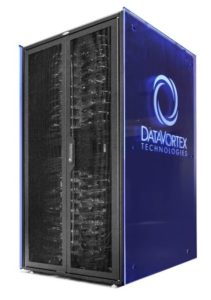Data Vortex Technologies is tackling one of the greatest challenges in high performance computing: simulation of quantum computers. The main difficulty is that the amount of memory and processing power needed to simulate a general quantum algorithm grows exponentially with the number of quantum bits (qubits). During a simulation, it is necessary to store and repeatedly process 2qubits complex floating point numbers in a distributed system, and depending on the problem this ranges from terabytes to petabytes of data and beyond. For this reason, the largest number of qubits that can be simulated in any large classical computer is around 50.
What makes the problem even more demanding is that it is also necessary to communicate all this data between the compute nodes and this has to be done repeatedly and sufficiently fast. Here is where Data Vortex comes into play: part of our research focus on investigating techniques is to take advantage of this novel network to achieve this goal. Currently we are simulating quantum programs in the DV206 system HYPATIA, a small 64-node testbed powered with off-the-shelf Intel processors which is capable of running quantum programs up to 40 qubits. Our programs are fully scalable and can simulate more qubits with larger machines.
There are several approaches to simulate a quantum computer, each has its pros and cons. The formulation that Data Vortex is working on is the universal gate-level simulation of general, ideal quantum circuits with a full description of all the quantum states. These simulations are capable of simulating the most promising quantum algorithms: those that exhibit quantum acceleration, such as the Quantum Fourier Transform, Shor’s factorization of integers and Grover’s quantum search.
We adapted this formulation to describe the effects of noise and decoherence on the quantum computation, which are among the main obstacles in quantum computing. This allows us to quantify the highest amount of noise that the quantum algorithm can withstand while still giving accurate answers. Our simulations can be used to investigate future error correcting circuits that minimize this problem.
Although real-hardware quantum computers are recently coming online, most notably by Intel, Google, IBM and numerous research centers around the world, quantum simulation will always be indispensable for the design of quantum algorithms because of an inconvenient feature of quantum mechanics. If the programmer attempts to observe the internal quantum state of the computer in the middle of a computation, then this state will collapse ruining the calculation. Moreover, the number of bits that can be measured is severely limited to the number of working qubits. On the other hand, in a quantum simulation one has unrestricted access to all the internals and the dynamics of the quantum state, making simulations the ideal tool to debug and profile quantum programs.

That bring us to the other side of our research: profiling of quantum code and circuit synthesis. On a classical computer, profiling can be done with tools that can run in the target computer, but on a quantum computer this can only be fully done in a simulator. We are developing tools that will help the quantum programmers to visualize the internal quantum state of the computer as the algorithm executes each of its gates, and tools that assist the programmer to synthesize new quantum circuits.
In addition, quantum computer simulation serves as an excellent benchmark for novel parallel computer architectures because it strains in equal measure processing power, memory and communication bandwidth. Regardless of how large these resources are, each additional qubit doubles the demand of all of them. That makes this simulation specially fit to test very large systems.
About the Author: Santiago Betelu, PhD, is the Director of Research Science at Data Vortex Technologies and an adjunct professor at the University of North Texas.






























































